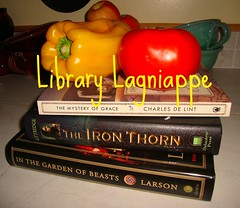 Interlibrary loan is basically the sharing of materials between libraries. If you want something, and your own local library doesn't have it, they can usually request it via interlibrary loan -- basically, asking another library to send whatever it is to your library so you may borrow it. Pretty cool, huh? And it's not limited to books. Our library requests books, CDs, DVDs, and even journal articles (which is really helpful, since our article databases might not have everything as full-text).
Interlibrary loan is basically the sharing of materials between libraries. If you want something, and your own local library doesn't have it, they can usually request it via interlibrary loan -- basically, asking another library to send whatever it is to your library so you may borrow it. Pretty cool, huh? And it's not limited to books. Our library requests books, CDs, DVDs, and even journal articles (which is really helpful, since our article databases might not have everything as full-text).How long has it been around? Well, if you'd believe it, 1894. A man named U.L. Lowell, a librarian at the University of California, Berkeley, sought permission to start this practice and was able to initiate the first ILL program, in partnership with the California State Library. From there, is all started to expand and now, we have the system we use today.
How does it work? For my library, when someone wants something, we start by checking libraries in a local system, since we're on their delivery route. That's the fastest way for us to get materials, since delivery usually takes 5 days or less. If we don't see it in the local system, however, we turn to WorldCat. WorldCat is one of my favorite things. I admit it -- I'm a geek. But, WorldCat is this wonderful thing powered by OCLC (Online Computer Library Center), and if you look something up, you can instantly see all of the libraries that own that item. WorldCat is the world's largest bibliographic database and contains more than 150 million different records that point to more than 1.4 billion physical and digital items (and in more than 470 languages). Can you understand why I geek out over this? Seriously, I could devote an entire post to WorldCat.
But anyway - on to the ILL process. If it's not in our local system, we look up whatever it is in WorldCat. WorldCat lists all the owning libraries in order of State -- beginning with Illinois (my state), and then listing any other holdings in other states (alphabetical by state). Our library can request things from outside of Illinois, so this is really helpful to be able to see all libraries that own something just on one list. I cannot imagine how long it would take, otherwise, to check all the different catalogs of libraries (and it would be a huge pain in the butt). Once we know who owns the item (or article), since we're a member of OCLC, we go through a multi-step process to electronically send a request to a handful of libraries at once. Whoever can send the item, replies and sends it to our library. Depending on where that library is, it usually takes about 7 days for things to reach us. Then, we contact the person who requested the item, and they come in and pick it up.
Now, there are sometimes restrictions. Some libraries have policies that they won't ask for things that they won't lend out, like audiovisual materials, or videogames. Reference books usually don't qualify for interlibrary loan. E-Books are kind of impossible to share (at least, right now). And, due to cuts in funding, the process of loaning out materials can be restricted --- if your library is on some kind of delivery route, it's easier, but if you have to receive everything by US Mail, it can get expensive. The other thing that affects ILLs is whether or not your library is part of an electronic ILL loan network -- like belonging to OCLC. If you aren't a member of OCLC, it can be a bit more cumbersome to request things, although it is do-able.
Although it's not a perfect system, it's pretty darn good. Being able to share things with other libraries allows us to not worry so much about having every single thing in the world in our own collection. I work at a public library, and we're not too huge, so there's no way we could have, say, a large number of academic titles on obscure subjects. But the nice thing is, usually there is some other library that does have what our patron needs, and all we need to do is ask. Many libraries belong to a group called LVIS (Libraries Very Interested in Sharing), so about 95% of the time, it's completely free to have things sent to us. Yes, completely free. How cool is that? Very cool.
So, the next time you don't see something at your library, don't walk away in disappointment --- ASK at your library's Reference Desk to see if they can ILL it for you (or at least try to).
That's the Library Lagniappe for now. If anyone has suggestions for a future topic, let me know!



















1 comments:
Informative post! My library has always been great about finding books for me. I didn't realize the effort that went on behind the scenes but it's much appreciated.
Post a Comment
Thank you for taking the time to comment!
Please note that I am officially designating this blog an award-free zone. Thank you!!